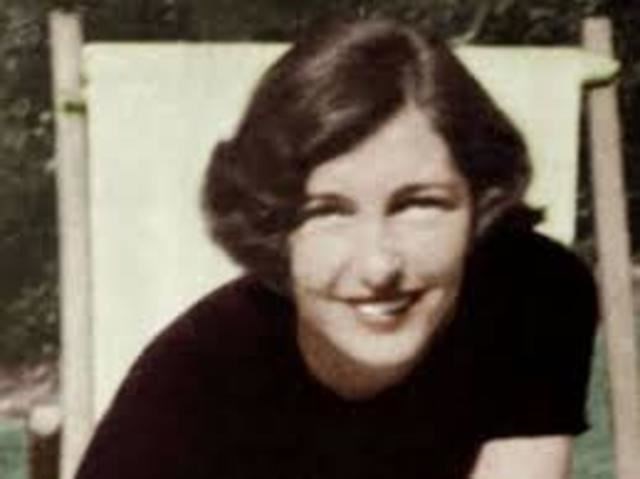With a pistol you can defend yourself against, at most, one person. With a hand-grenade, against five, perhaps ten -Krystyna Skarbek
 Krystyna Skarbek (Christine Granville)Niken14 [CC BY-SA 4.0 (https://creativecommons.org/licenses/by-sa/4.0)]
Krystyna Skarbek (Christine Granville)Niken14 [CC BY-SA 4.0 (https://creativecommons.org/licenses/by-sa/4.0)]
Churchill’s Favorite Spy
When Germany invaded Poland during 1939, the invasion helped spur many to the aid of the Jewish people and to that of Poland. One of the many who answered this call was Krystyna Skarbek. Krystyna Skarbek, also known as Christine Granville, was a Polish spy who worked for Britain’s Special Operations Executive during World War II and was the first and longest serving woman to work for the SOE. She was born to a Polish Count and his Jewish wife and later became Churchill’s favorite spy (Syeda) and the inspiration for Ian Fleming’s first “Bond girl” (“Christine Granville”). Another one of Skarbek’s many feats was skiing into occupied Poland during the winter of 1940, the coldest winter in living memory (Mulley 64). Skarbek’s quick thinking skills were shown when she faked tuberculosis to escape interrogation by the Germans (Syeda). Her bravery was demonstrated when she convinced Janek Marusarz, a member of Poland’s Olympic skiing team, to guide her through the Tatra Mountains and into occupied Poland (Mulley 64). Krystyna Skarbek is a deserving hero because of her quick-thinking skills in action and her courageousness in the field.
Krystyna Skarbek’s quick-thinking skills in action saved the lives of herself and many others. Skarbek was sent into France and was stopped by Nazi police while holding a silk map of the area: “Unable to run, or hide what was in her hands, she calmly shook the map out and used it to tie back her hair before greeting the soldiers and persuading them that she was just a local woman, running errands in her sandals” (¨The spy who loved men¨). Skarbek was able to use her resources wisely and in a way that wouldn’t get her caught while looking danger in the face. Through her clever thinking, Skarbek was able to save herself without risk of imprisonment or incriminating others in the process. Another close call was when Skarbek was on a train full of German officers who were checking people’s identification papers while she had a package of propaganda and “she was growing increasingly uneasy about her bundle of papers… [and] after a while she asked [an] officer if he would be kind enough to carry a black-market parcel of tea she was bringing [with her] to her sick mother” (Mulley 67). Skarbek was able to think quickly about an explanation for her suspicious parcel, but it was still dangerous for her because she told the officer that the tea was from the black market. Having illegal tea could still have gotten Skarbek in trouble, but having a package of propaganda would’ve gotten her in to much more trouble. She was able to save herself by tricking an officer while keeping the propaganda with her so that she could distribute it. All in all, Skarbek was a quick thinker in the field and a brave person in action.
 Tatra Mountains which Skarbek skied overPiotr J [CC BY-SA 3.0 (https://creativecommons.org/licenses/by-sa/3.0/)]Krystyna Skarbek’s willingness to risk her life for others during World War II makes her courageous. One way Skarbek demonstrated her fearlessness was by “[proposing to travel to] Hungary, which was then still neutral, and from there skiing into occupied Poland“ (“The spy who loved men”). Skarbek was willing to put herself in danger to help the war effort, making her heroic because many people would’ve stayed where they were and done as much as possible to avoid attention from the Nazis. While these people were bystanders to the persecution of Jews, Skarbek threw herself head first into danger. While in Poland, Granville’s fellow agents were captured and she came up with a risky course of action in order to save them: "Bribing a guard, she was taken to meet the Vichy collaborator who was in charge, and browbeat him for hours with threats of what his fate would be when the Allies arrived. Eventually he was shaking with fear. It was then two hours before the prisoners' planned execution. Instead they were put in a car, joined by Christine and driven away to be released. The commander came with them -- and disappeared. Of course, if her plan had failed, she would have been executed with them" (“The spy who had men for breakfast”). Skarbek managed to bribe and threaten a guard into releasing her friends and then managed to convince him to disappear with them when they left. She was willing to risk her life trying to get her companions released from prison which is courageous because many people would not have done so. Evidently, Skarbek was not only a quick thinker but also a courageous, strong woman.
Tatra Mountains which Skarbek skied overPiotr J [CC BY-SA 3.0 (https://creativecommons.org/licenses/by-sa/3.0/)]Krystyna Skarbek’s willingness to risk her life for others during World War II makes her courageous. One way Skarbek demonstrated her fearlessness was by “[proposing to travel to] Hungary, which was then still neutral, and from there skiing into occupied Poland“ (“The spy who loved men”). Skarbek was willing to put herself in danger to help the war effort, making her heroic because many people would’ve stayed where they were and done as much as possible to avoid attention from the Nazis. While these people were bystanders to the persecution of Jews, Skarbek threw herself head first into danger. While in Poland, Granville’s fellow agents were captured and she came up with a risky course of action in order to save them: "Bribing a guard, she was taken to meet the Vichy collaborator who was in charge, and browbeat him for hours with threats of what his fate would be when the Allies arrived. Eventually he was shaking with fear. It was then two hours before the prisoners' planned execution. Instead they were put in a car, joined by Christine and driven away to be released. The commander came with them -- and disappeared. Of course, if her plan had failed, she would have been executed with them" (“The spy who had men for breakfast”). Skarbek managed to bribe and threaten a guard into releasing her friends and then managed to convince him to disappear with them when they left. She was willing to risk her life trying to get her companions released from prison which is courageous because many people would not have done so. Evidently, Skarbek was not only a quick thinker but also a courageous, strong woman.
During World War II, Krystyna Skarbek demonstrated quick wit and bravery to help defeat the Germans. Granville was an intelligent woman who managed to use her cleverness to evade and harm the Nazis. Her courageousness helped her undermine Germany and help the Allies. She made a difference during World War II, while many other people were content to do nothing. Skarbek is an inspiration because she “[brought]… anti-German propaganda, money and explosives [to Poland], and [helped] large numbers of Polish officers, many of them pilots, to escape through Hungary or Yugoslavia” (“The spy who had men for breakfast¨). Skarbek risked her life by spreading propaganda and helping Polish officers escape which is motivational because not many would have been willing to face the Gestapo. She was willing to put herself on the line in order to help others, which is admirable. During World War II, there were many people who just rolled over for the Germans and didn’t do anything to try and stop them or the persecution of Jews that they started. Skarbek was Jewish, making the fact that she became a spy even more encouraging because she was standing up for herself in order to stop the Nazis. Many people in today’s society like to think that if another evil came to power and the unspeakable happened that they would be brave enough to do something to stop it, but how many people really would? When Germany invaded Poland, it helped spur many people to their aid, but would you have answered the call for help, or would you have rolled over, belly-up, for the Nazi Regime?
Works Cited
"Christine Granville." Encyclopedia of World Biography, vol. 27, Gale, 2007. Biography In
Context,https://link.galegroup.com/apps/doc/K1631008874/BIC?u=powa9245&sid=BIC&xid=5e32e4f7 . Accessed 21 Mar. 2019.
Mulley, Clare. The Spy Who Loved: the Secrets and Lives of Christine Granville. St. Martin's
Griffin, 2014, pp. 64, 67.
Syeda, Seema. “Krystyna Skarbek: The SOE’s silent killer”. Military History, May 11, 2018.
https://www.military-history.org/articles/krystyna-skarbek-the-soes-silent-killer.htm
"The spy who had men for breakfast; BOOK OF THE WEEK; ... but few of them lasted 'til
dinner." Daily Mail [London, England], 31 Aug. 2012, p. 55. Biography In Context, https://link.galegroup.com/apps/doc/A301251604/BIC?u=powa9245&sid=BIC&xid=0c0c4a38 . Accessed 25 Mar. 2019.
"THE spy who loved men; She was Churchill's favourite spy, the inspiration for Bond's lover in
Casino Royale, and always had a knife strapped to her thigh. But a new book reveals her most deadly weapon was seduction ..." Daily Mail [London, England], 6 Oct. 2012, p. 54. Biography In Context, https://link.galegroup.com/apps/doc/A304544993/BIC?u=powa9245&sid=BIC&xid=9b107d59 . Accessed 25 Mar. 2019.
Page created on 4/8/2019 9:09:15 PM
Last edited 4/15/2019 6:31:41 PM
Images were found on commons.wikimedia.org
